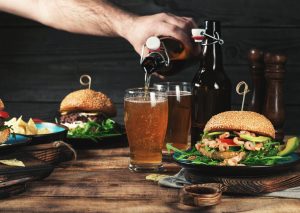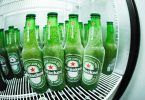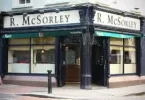Tourism may not recover until middle of decade – report

“If the 2008 crash showed us anything, it’s that what we lose now cannot be simply reconstructed next year.” – Liam Reid.
As many as 114,000 Accommodation and Food Service jobs in Ireland, 63% of the national total – including jobs in pubs, hotels, and restaurants – could be lost across the country by the end of this year, including 36,300 jobs among the 15-24 age group according to the report entitled Employment in the drinks and hospitality industry: the threat of Covid-19 to jobs and how to minimise it.
This includes 36,300 jobs among the 15-24 age group.
Some 7.6% of all national employment is in the AFS sector while 31.8% of all workers are in the 15-24 age group and the majority of all employees are women (54.6%).
Carried out by DCU Business School economist Anthony Foley it was commissioned by the Drinks Industry Group of Ireland and shows that the 15-24 age group, which comprises nearly a third of all AFS employment in Dublin, is particularly exposed and could suffer 10,600 job losses before the end of 2020.
The industry’s current commercial environment is dire, points out the report: restaurants are operating at approximately 60% capacity, pubs serving food at 50%, and hotels at 25%. These figures are unlikely to improve over Christmas and the Winter period. Tourism is non-existent and few social or cultural activities are permitted.
At the outset the report points out, “While all pubs, with the temporary exception of Dublin, are now permitted to reopen on 21 September in accordance with Covid guidelines, the real question is how many of them and the jobs they provide will survive the next six months?
“After half a year of closure for pubs and significant periods of closure for all hospitality businesses, including restaurants and hotels, they must now contend with an indefinite period of reduced operating capacity and opening hours as well as the postponement of all supporting social and cultural activities. Tourism will remain virtually non-existent in 2020, significantly reduced in 2021 and may not fully recover until the middle of the decade.”
Dublin’s lockdown and further restrictions on restaurants and pubs serving food there will have grave material consequences for thousands of livelihoods, hundreds of businesses as well as local communities and Ireland’s long-term economic prospects, said the new Chair of the Drinks Industry Group of Ireland and Director of Corporate Affairs at Diageo Ireland Liam Reid, “Every drinks and hospitality business owner in Dublin and across the country realises the public health risks associated with Covid. They’ve supported the longest hospitality lockdown in Europe and where they’ve been able to open, they’ve taken steps to ensure their staff and customers are safe and that their premises are controlled environments and invested tens of thousands of euros doing so.
“If the 2008 crash showed us anything, it’s that what we lose now cannot be simply reconstructed next year. If businesses cannot operate, jobs will go. This is a highly precarious industry and every week of closure counts. The long-term risk is enormous and a specific package of support measures is urgently required.”
Knock-on effects on the rest of Ireland
Lockdown in Dublin will also have knock-on effects on drinks and hospitality businesses elsewhere in the country as domestic tourists from the capital cancel their bookings in regional hotels, restaurants, and pubs.
In the South-East region (Carlow, Kilkenny, Waterford, Wexford) AFS jobs make up 8.5% of all employment. In Donegal, AFS employment accounts for nearly 8% of all county employment and in Kerry the figure is as high as 10.5%.
“These jobs matter,” continued Liam Reid, “For many, the drinks and hospitality sector is a lifelong career. For others, like students, carers, homemakers and older people, the industry provides an invaluable degree of flexibility, allowing them to earn money part-time while still carrying out other duties and responsibilities.
“For all, drinks and hospitality businesses are one of the few sectors in their locality where actual employment opportunities exist, the business where they first start to develop skills and qualities that stand to them forever. If these businesses close for good, many villages and towns will be left with little to no employment opportunities.”
Immediate additional remediation
The DIGI is calling on the government to aid the drinks and hospitality industry by removing barriers to business and deliver a comprehensive and coordinated set of measures over the coming period to support their recovery.
“Reopening these businesses is not enough,” said Liam Reid, “We have to focus on recovery, which means making it as easy as possible to actually do business within Covid guidelines. Ireland’s pubs, hotels, restaurants and wider drinks and hospitality industry needs practical financial supports this year. As this report shows, intervention in 2021 will be too late and jobs will be lost.
“Ireland’s excise taxes are the second-highest in Europe and will act as a further barrier to recovery. As part of a broad package of measures we’re calling on the government to deliver a 15% reduction in excise tax on drinks to support the industry and minimise the risk of job losses. More money back in the business owner’s pocket means more money can be directly invested in keeping their doors open and saving their staff from unemployment.”
The Tax Strategy Group recently produced a table showing the estimated effect of a range of VAT-inclusive increases and decreases in excise duty yield for beer, spirits and cider as well as the estimated effect of a range of VAT-inclusive increases in excise duty yield for still and sparkling wine.
Table 7: Budgetary Options
| +/-1c | +/-2c | +/-3c | +/-4c | +/-5c | +/-10c | +/-15c | +/-20c | |
| Beer (per pint) | €6.8m | €13.6m | €20.4m | €27.2m | €34.0m | €67.5m | €100.7 m | €133.5 m |
| Spirits (1/2 glass) | €4.2m | €8.4m | €12.6m | €16.7m | €20.8m | €40.9m | €60.3m | €79.1m |
| Cider (per pint) | €1.0m | €1.9m | €2.9m | €3.8m | €4.8m | €9.5m | €14.1m | €18.7m |
| +5c | +10c | +15c | +20c | +25c | +50c | +75c | +100c | |
| Wine (per bottle) | €3.2 m | €6.4m | €9.5m | €12.6m | €15.7 m | €30.3 m | €43.9 m | €56.5m |
| Sparkling Wine (per bottle) | €0.06 m | €0.11 m | €0.17 m | €0.22m | €0.28 m | €0.54 m | €0.79 m | €1.03m |
Notes:
(1) these figures do not incorporate the temporary 2% cut in the standard VAT rate
(2) these figures assume no change in consumer behaviour, including in relation to cross border purchases.
DIGI’s members include:
∙ Drinks Ireland (Ibec)
∙ Irish Hotels Federation
∙ Licensed Vintners Association
∙ National Off-Licence Association
∙ Restaurants Association of Ireland
∙ Vintners Federation of Ireland








